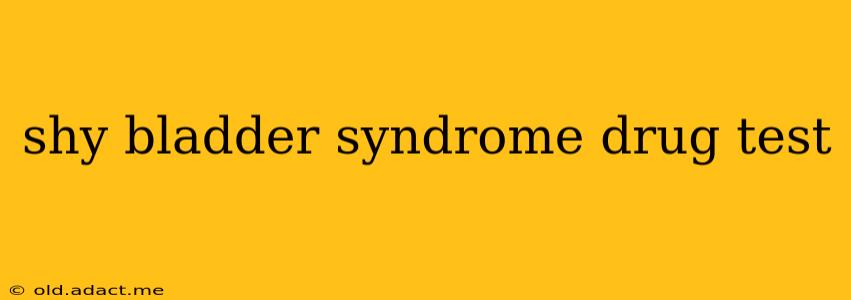Shy bladder syndrome (also known as paruresis) is a condition characterized by the inability to urinate in the presence of others. This can cause significant anxiety and distress, especially in situations requiring public restroom use or medical procedures involving urine collection. While not a physical blockage, the psychological component of shy bladder syndrome can create challenges, particularly when facing a mandatory drug test. This article addresses common concerns surrounding shy bladder syndrome and drug testing.
Can Shy Bladder Syndrome Affect Drug Test Results?
The short answer is: shy bladder syndrome itself doesn't directly affect the accuracy of a drug test. The test analyzes the urine sample for the presence of specific substances. However, the inability to provide a sample due to paruresis can lead to a failed or inconclusive test, regardless of whether drugs are present in the body. This is because the absence of a sample is often interpreted as non-compliance.
What Happens if I Can't Urinate During a Drug Test Due to Shy Bladder Syndrome?
This is a complex situation. It's crucial to disclose your condition to the testing personnel before the test begins. Providing documentation from a healthcare professional diagnosing paruresis can significantly help. However, the specific outcome depends on the testing context and the policies of the organization administering the test.
Some possible outcomes include:
- Rescheduling the test: In many cases, you may be given an opportunity to reschedule the test in a more private setting, potentially with a chaperone of your choice, or using a different testing method.
- Alternative testing methods: Depending on the situation, alternative methods like a blood test might be considered. However, this isn't always possible and is determined on a case-by-case basis.
- Failed test: Unfortunately, some organizations may interpret the inability to provide a sample as a failed test, even if the underlying cause is a medical condition. This could lead to negative consequences depending on the context (employment, legal proceedings, etc.).
How Can I Manage My Shy Bladder Syndrome Before a Drug Test?
If you know you have an upcoming drug test, proactive steps can help minimize the risk of issues:
- Inform the testing facility in advance: This allows them to prepare and potentially offer accommodations.
- Seek professional help: A therapist specializing in anxiety disorders or a medical professional can offer strategies to manage paruresis, including relaxation techniques, cognitive behavioral therapy (CBT), or medication in some cases.
- Practice relaxation techniques: Deep breathing exercises, meditation, or mindfulness can help reduce anxiety.
- Consider a private restroom: If possible, try to arrange to urinate in a private setting beforehand to reduce anxiety.
Is There Medication to Help with Shy Bladder Syndrome During a Drug Test?
There is no specific medication approved solely to treat paruresis during a drug test. However, depending on the severity of your condition, your doctor might prescribe medication to help manage anxiety. It's crucial to discuss any medication with your doctor and the testing facility well in advance to avoid any complications. Some medications can show up in drug tests and could lead to false positives.
What if I Fail a Drug Test Due to My Inability to Provide a Sample Because of Shy Bladder Syndrome?
Failing a drug test due to an inability to provide a sample because of shy bladder syndrome is a difficult situation. You should immediately seek legal counsel if the test has legal implications. If it's for employment, you should explain the situation to your employer and provide documentation supporting your diagnosis. The outcome depends largely on the specific circumstances and the policies of the relevant organization.
Can I Use a Doctor's Note for a Drug Test if I Have Shy Bladder Syndrome?
Providing a doctor's note confirming your diagnosis of shy bladder syndrome is a crucial step in supporting your case. It establishes the medical basis for your inability to provide a urine sample. However, acceptance of the note depends entirely on the organization administering the test and their policies. Some may still require a sample, while others might accept the documentation as sufficient evidence.
This information is for educational purposes only and is not a substitute for professional medical advice. Always consult with a healthcare professional for any medical concerns or before making any decisions related to your health or treatment. It's vital to discuss your specific situation with both your doctor and the testing facility well in advance to explore all possible options and mitigate potential difficulties.
